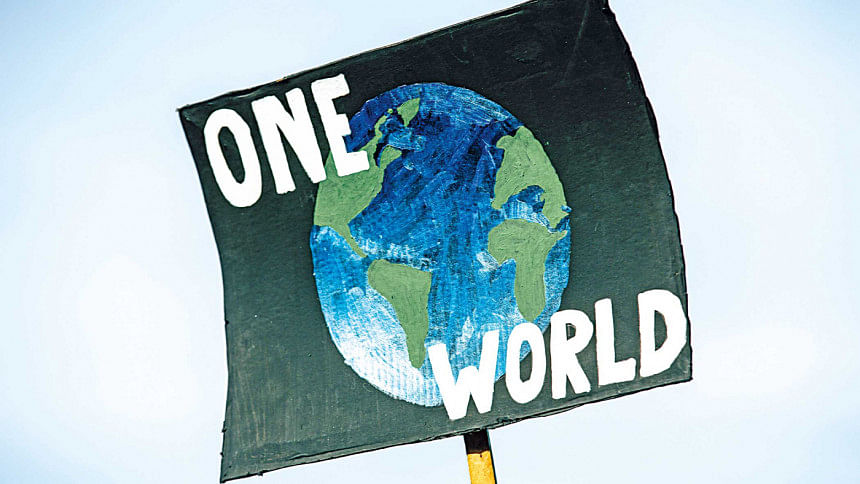Living sustainably in harmony with nature

The theme for World Environment Day (WED) 2022, 'Only One Earth', calls for resetting the balance with nature through transformative changes in how we eat, live, work and move around. As citizens, workers, students, consumers or in any number of other roles, our individual decisions shape how our societies impact the environment. As well as making our personal lives more sustainable, as individuals we can press for and support faster and more far-reaching environmental change from larger entities like governments and businesses.
Here are some actions that we can take on our own to make the shift from harming the planet to healing it.
Balance your diet
A balanced, plant-based diet is good for our health and for the planet because it provides energy and nutrients from several different food groups. The special report (2019) on climate change and land by the Intergovernmental Panel on Climate Change (IPCC) states that balanced diets comprising plant-based and sustainably produced animal-sourced food "present major opportunities for adaptation and mitigation while generating significant co-benefits in terms of human health."
We also need to reduce consumption of foods that require more natural resources, especially water, to be produced. Meat, for example, uses more water than plants and pulses. A recent study claims that if every person in the US cut their meat consumption by 25 percent, it would reduce annual greenhouse gas emissions by 1 percent. Wide varieties of beans, lentils, seeds and green peas are some alternative protein options which one may weigh up.
Besides adopting a balanced diet, we should also be careful about food waste because it aggravates climate issues, inducing additional methane to enter our environment. Therefore buy only the food you need and use it all up.
Finally, try to grow food in your yard or on your balcony. It will not only save money but also reduce the transport, packaging and waste of food. Nurturing plants also improves mental well-being.
Stay away from fast fashion
Buying products and services with low environmental footprints can significantly curb environmental pollution and boost green businesses. Think about what you really need and cut back the amount of stuff that you buy. Choose items that are made to last and that can then be recycled or repurposed.
Stay away from fast fashion that mass produces at the cost of the environment and labour standards. Buy fewer and better clothes that you still like even when they show their age. Conserve energy
Changing your habits can also make a big difference, so turn-off lights and electronics when not in use, use appliances with high energy-efficiency ratings in your home. This will reduce emissions and save you money.
Go cleaner
Burning fossil fuels accelerates the deterioration of our climate, and personal transport majorly contribute to this crisis. Hence, do more walking or cycling to cut vehicle pollution and road congestion while getting some fresh air and boosting your fitness. If walking or cycling isn't practical, opt for public and shared transport.
Ethical investing
Financial investments are a key lever in the hands of individuals. Check and make sure your personal savings, pension or investments are with financial institutions committed to the conservation of natural resources while avoiding those deemed detrimental to the environment. Transfer your accounts to a sustainable bank and invest in stocks and bonds issued by renewable energy firms, manufacturers of green products.
Stay curious and enjoy the journey
How we spend our free time hugely influences our impacts on the environment. Staying local for outings and holidays can reduce your carbon footprint, save you money and allow you to travel more slowly, without the stress of long journeys. If you do go the distance, do it less often but stay longer.
Keep an open mind and embrace a life of constant learning, adventure, and curiosity. There are many sustainable ways to live a good life, so find out what makes sense for you and put into action!
Finally, we have to speak up for the big changes that really transform our relationship with the planet. Take a deep dive into the science around an environmental issue that concerns you and spread your knowledge with friends, family and your wider community, and in public discussions, including on social media. Join a local organization that advances sustainability and restores nature including by campaigning for systemic change.
The evidence of rapid climate change and degradation of the ecosystem are all around us and growing more ominous day by day. However, we can still avoid the worst of the crisis if we can make sustainable living possible by transforming consumption, production, infrastructure, investment and land use and making them inclusive, fair and more connected with nature.
In the universe there are billions of galaxies, in our galaxy there are billions of planets, but there is #OnlyOneEarth. Let's take care of it.
Source: Only One Earth Practical Guide / World Environment Day 2022

 For all latest news, follow The Daily Star's Google News channel.
For all latest news, follow The Daily Star's Google News channel. 



Comments